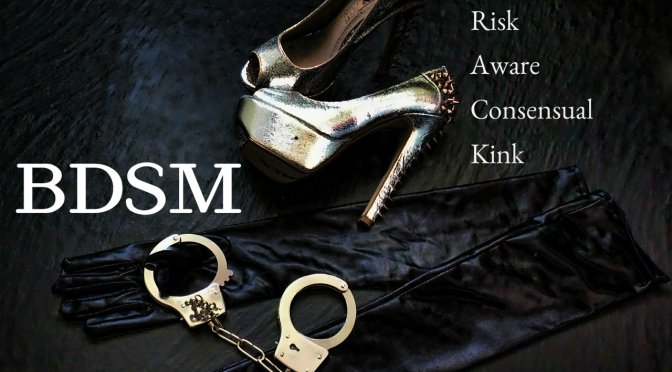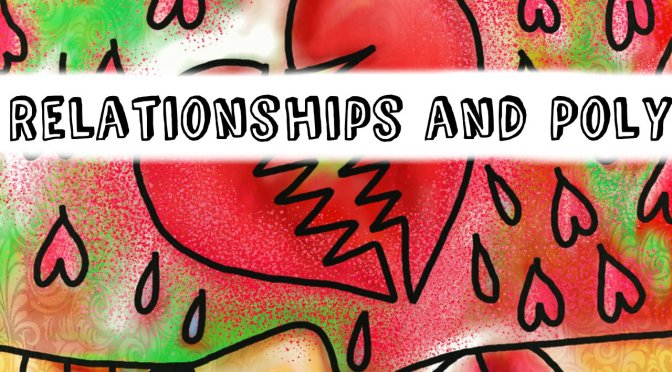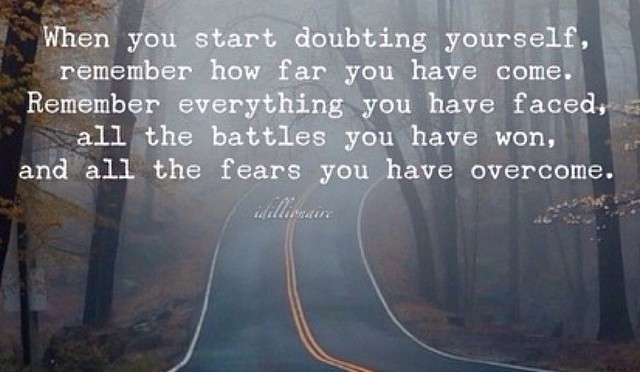The Connections Between Fundamentalist Religion and BDSM
BDSM (Bondage, Discipline/Dominance, Sadism/Submission, Masochism) is a spectrum of interests that range from simple things like blindfolds and feather ticklers to whips, chains, blood, and screams of delighted suffering. It’s highly stigmatized and misunderstood in our culture, which I think is unfair. BDSM is no more violent than the things described in Scripture, and in fact Scripture is sometimes the inspiration for them.
As a former missionary and pastor who went to Bible college, deconverted from fundamentalist Evangelical Christianity, and is now a professional Dominatrix and full-time BDSM practitioner, I am in a unique position to comment on this topic. I’ll probably write a book on this someday… but for now, here are a few of my observations.
Quick things to know about BDSM:
50 Shades of Grey is NOT a good example of BDSM. Christian Grey is abusive and a stalker, not a responsible Dominant.
BDSM is sometimes sexual, but often it is not. Platonic friends will often play together and many types of play have nothing to do with sex.
My favorite BDSM acronym is PRICK: Personally Responsible Informed Consensual Kink. Others include RACK: Risk Aware Consensual Kink, and SSC: Safe, Sane, and Consensual. This sums up BDSM attitudes on consent quite well. It is core to everything that we do.
The Bible discusses sexual slavery at great length. Women are property, owned or ruled by men, always submissive to male power and authority. Women had no say over their own bodies, and they were the property of their fathers until a husband or slave master took over control. “Wives, obey your husbands.”
In BDSM, sexual slavery is often a theme. But unlike the fundamentalist version of this, in BDSM the focus is on everyone’s consent, pleasure, and willingness to be involved, and all genders participate in whatever role they enjoy most. Unlike in the Bible, where women who broke sexual laws were stoned or forced to marry their rapist, and where sexual submission was compulsory, in BDSM all a woman has to say is her Safe Word and it all stops. She has control of what she allows to be done to her; even a Dominant man who is her master is limited by the control she gives him. No one can have sex with her or hit her unless she allows it. No one can put a submissive collar on her unless she consents, and she can remove it if she feels it is no longer a safe, healthy, or pleasurable relationship.
Nowhere in the Bible is a woman’s bodily autonomy expressly protected. She is always property with no say in her life, and no one cares about her consent. In BDSM, bodily autonomy and consent is core to everything that we do. It is what separates our play from abuse.
Violence is a key part of the Bible. Growing up I read the Bible through a couple dozen times, easily, and I studied it further in Bible college. I know far too well all the stories of violence, rape, forced marriage, child marriage, genocide, war, mass drowning of women and children, and murder. Most of it was justified because either God allegedly did it or commanded it to be done, so I had to learn how to accept much of this violence in my mind. Now as an adult who is not religious, that violence ingrained in my mind needs a healthy outlet. BDSM allows me a healthy, consensual outlet for my inner violent side which was encouraged by all the violence I studied in Scripture.
Control is also a huge theme in the Bible. There are rules, laws, and restrictions on almost every part of life. And, there are severe punishments for not following the rules (social punishments, banishment, execution, Hell, etc.) So, being trained to follow strict rules was something I was taught from an early age. Is it any surprise now that I enjoy intense BDSM relationships where I give over control to someone else, and obey their commands? I was groomed to do exactly that. Except I’m not ashamed anymore for saying “no” to things I’m not ok with. That is NOT something the Bible taught me.
Corporal punishment! “Spare the rod, spoil the child.” The Bible encourages spanking disobedient children. I was spanked as a child and so were many of my kinky friends. Is it any surprise that as an adult I enjoy being spanked and ordered around in the bedroom too? The difference now is that it’s consensual and pleasurable for me. I am only spanked or ordered around if I consent to that kind of play, and I only play with people I trust to respect my personal boundaries and stop when I’ve had enough.
Pain. Masochists are people who gain pleasure or fulfillment from experiencing pain. I like to compare it to runners who like the “Runner’s High” that they get when they push themselves physically; endorphins are released that feel good. In fundamentalist Christianity, especially back in the Dark Ages and Medieval times, it was not uncommon for some religious fundamentalists to beat themselves, starve themselves in extended fasting, and otherwise cause discomfort and pain to themselves. This was believed to bring them closer to God somehow and people do this even to this day, as I know from personal experience in my religious days. I read about these extremist people growing up, and sometimes they were portrayed as heroes for me to emulate. Is it any wonder that I am not afraid to experience pain now and even find positives in it? Fundamentalism taught me that it’s ok to like pain if it’s in service to God or in punishment of wrongdoing. Why isn’t it ok to enjoy consensual pain because it brings me and my partner pleasure, or because it “gets me out of my head” for a while and I can relax?
The biggest differences that I have experienced between religious fundamentalism and BDSM are freedom, consent, and bodily autonomy. Instead of trying to force myself into a box I didn’t fit into, now I am in a world where I control my own life even when I am playing a submissive role. If I don’t like what’s happening and feel scared or misused, I can say no and make it stop. I couldn’t do that with religion. There was no Safe Word to end the terror of Hell. I had no authority over my own life, I had to obey and follow men or God in all things even if I disagreed. A “woman’s place” is now whatever I decide it is.
CBT (Cock & Ball Torture) Tips and Advice (Please contribute yours!)
I’ve been getting a lot of requests for info on being a new top/domme, so I want to do more information sharing. I’m still a fairly new domme myself, and I’m always looking for tips and advice from more experienced tops/dominants, so I am looking for your advice as well. Here are a few things I’ve learned, and I welcome your thoughts in the comments.
Some balls are super sensitive. Like, you touch them and the person faints. With those genitals, you must be very gentle and CBT will probably require only light touches to inflict discomfort. However, some balls are a lot tougher than we realize and those people can handle (and possibly even enjoy?) a VERY tight squeeze. With sharp fingernails. Or metal claws. (Muahahahaha.)
The only way to know how much you can squeeze someone’s balls is to try it. (Evil grin, rubs hands together) As in, ask the bottom and then gradually increase the pressure until they reach whatever limit they have set.
Why do I enjoy CBT? I’m a sadist, for one. But it’s also because sometimes asshole type men really piss me off, and I like to relieve some of that frustration by bringing a grown man to his knees just by squeezing my dainty little fingers. After a lifetime of being told I must always bow to masculinity because I was feminine and God said so, I like turning the tables. After being harassed and assaulted by men, now I can bring a man to his knees and be the one calling the shots.
I really need to order metal claws though because fingernails just aren’t mean enough… And electricity. Ooooooooh electricity with metal claws on balls would be SO much fun.
Most of my experience has been with squeezing and punishing balls. I have no personal interest in Sounding (cool for you, but it squicks me out!) and I haven’t done much cock torture other than slapping and squeezing.
The Good, The Bad, The Poly: WCB Class Notes and Handout Text.
With permission from the amazing speaker Allena Gabosch, who I had the privilege of getting to know this weekend at Westcoast Bound, I’m going to share the content of her class handout. I’ll also include my notes and thoughts from the class for those who couldn’t attend.
I loved this class! A lot of my education in communication and relationship methods was from a religious background, so trying to apply them to poly as an atheist was difficult. Learning new communication skills in relevant contexts is awesome. Thumbs up for good poly classes.
The Handout we received in class, which I’ve typed out here:
Some of our principles we try to live and relate by:
* No surprises are allowed (except surprise parties and gifts and cards and that kind of fun stuff.)
* Make clear agreements on what each person is supposed to do.
* Each person should be clear about their intentions.
* Each person should be clear about their expectations of the other.
* No secrets or secret agendas are allowed.
* Find ways to be genuinely supportive and uplifting toward one another, especially when times are tough.
* Keep a sense of humour when working out differences of opinion.
* If one loses their sense of humour, the other should be forgiving.
* If one gets out of line, the other should be firm but forgiving, and the one out of line should acknowledge the infraction when it is pointed out.
* When disagreeing, interruptions, raised voices, angry movements and demeaning language during disagreements are never appropriate and must be apologized for when they are pointed out.
* Apologies for interruptions, raised voices, angry movements and demeaning language during disagreements must be accepted.
* When disagreeing, neither person is allowed to say “I already told you such and such”- they have to patiently repeat themselves.
* When disagreeing, neither person is allowed to accuse the other of starting the argument or creating the disagreement.
* If one has bad feelings about the other during or after a disagreement they are not allowed to blame the other for these bad feelings.
* Past disagreements are not valid issues during a current disagreement- no “generalizing” and no “bringing up the past” is allowed.
* Short breaks from arguments are allowed but when possible disputes should be resolved on the same day they begin.
* If a departure is necessary during a disagreement it must be civil and courteous.
(Created by Allena Gabosch and Steve Gabosch 1997. Allena’s website is eroticcoaching.com, email allena.gabosch@gmail.com).
My class notes and thoughts:
Reality is rarely the same as what we imagine in our heads. (This is especially true for those of us with anxiety or depression or other mental illness.)
I liked how she described making agreements instead of rules for poly partners (not counting D/s).
When we break agreements, we need to acknowledge it and make it right. Pretending the problem doesn’t exist or that the hurt never occurred just damages the relationship further.
Safer sex! The person with the strictest rules should set the pace for what’s allowed. Talk to all partners about what they’re comfortable with, and make agreements about it.
Disclosure. Different details for different partners; negotiate separately with each of them. Some partners may want to know everything about their partner’s other relationships, but others may feel uncomfortable or jealous with knowing too much.
People change over time; sometimes their relationship structures do as well. Partners should renegotiate or check in on their agreements on a regular basis.
We tend to be afraid to speak what we feel, but this causes problems. Poly works best when everyone involved is actively trying to communicate effectively and share their feelings in a healthy way. Bottling up our feelings causes resentment, misunderstandings, and avoids opportunities to deepen intimacy and trust with each other.
We are not therapists. If our partner has a mental illness or has dealt with trauma, we can only support and love them- we cannot change them or fix them. They need to take personal responsibility for their own mental health and get therapy, make life changes, etc.
Adding new partners.
DO NOT add more partners or open your relationship if your current relationship is not stable. It’s a disaster waiting to happen that can destroy both the current relationship and the new one.
Be considerate of each other when starting with a new partner. There will be lots of changes, which can be scary or frustrating for your current partner, and they will need extra support and communication while things are settling.
No surprises! Talk to people in poly groups before making big chances or decisions that affect them. Surprises (not talking about surprise parties) can result in partners feeling ganged up on, left out, betrayed, etc.
NRE (New Relationship Energy) can be extremely devestating to poly relationships. People can become addicted to the “high” of new relationships. Some poly people do this so often that they start to get a reputation for always wanting this new high.
MRE, or Mature Relationship Energy, is different than NRE and takes longer to develop, but it’s much more satisfying in the long run. (I love that she mentioned this because it’s such an awesome relationship aspect that’s often overlooked in favour of NRE. MRE is so beautiful and precious and offers a depth of intimacy that we can’t get elsewhere.)
Metamours.
It’s unwise to allow partners to veto other partners after three weeks. By the time a few weeks have passed by, there are usually lots of feelings being developed and a veto causes much more pain.
Don’t make a rule about partners not falling in love with other people. But, you can ask to be informed before they act on it.
A known entity is less scary than an unknown entity. Metamours often do better when they are friends, or at least meet each other.
Couple Privilege: This attitude is devastating to other relationships in the poly group. If one partnership gets all the say, all the time and all the attention, and the other parties feel left out or unheard, things will fall apart very quickly.
Secondaries often have little to no power in their relationships. Hierarchies are very easy to misuse, and the primary couple is often unaware of how unfairly the other partners are being treated until things have already exploded or fallen apart. Treat secondaries as a beloved family member, not as disposable or less important, and watch them thrive.
Let metamours become an accessory to love! They can help you get excited about getting ready for your date, picking out a gift for the metamour’s birthday, etc. But make sure they are wanting to do this.
Have a regular date night with all partners, and never break them without offering an apology, valid explanation, and a replacement date night as soon as possible. Regular date nights are immensely helpful in keeping everyone happy and meeting their needs. Even if you are domestic partners with someone, make sure there’s a designated date night. Spending all day with them at home is not the same as focusing on them in a date setting and living with someone (or even marrying them) doesn’t mean we don’t need to date them anymore. Never stop pursuing your partners, even when you’ve already won them.
Group date nights, or “family date nights”, are also a wonderful idea for some poly groups. Being on happy terms with metamours, and regularly checking in with each other to make sure everyone is happy, is immensely helpful in promoting healthy poly relationships. The group can ask each other “what do you need to be happy?” The group can ask itself that question too. “What do WE need to be happy?”
Dealing with jealousy.
It is ok to be jealous in poly. Almost everyone is. It’s a normal human emotion. Emotions are normal and we cannot control what we feel, so judging partners for feeling jealous is not helpful.
What can we control? Our actions. “Jealousy is like kids. You can let them in the car, but don’t let them drive. And if you stuff them in the trunk they’ll get out eventually when you’re not prepared for it.”
Self reflection helps. Why am I jealous? Is this my inner issue, or is there a problem with the relationship that I’m becoming aware of? Communicate with your partner. “I’m feeling insecure. You don’t need to do anything about it, I just need you to know.” Verbalize the feelings, don’t act on them. If the jealousy is due to a problem in the relationship, talk it out.
Jealousy is “I’m going to lose something that belongs to me.” But we don’t own our partners (other than in D/s). We constantly choose our partners. We choose that person AND that person, not that person OR that person. It shouldn’t be either or, but more like adding a new member to the family.
Benefits of poly.
There are lots of them! The one that stuck out to me most was that there is so much support when one person gets ill. Instead of one partner trying to do all the supporting, there are multiple people to help.
Not relevant to me, but raising kids in poly is also a huge benefit. No need for babysitters if you’ve got 3-5 parental figures involved!
Ending poly relationships.
It’s ok to end relationships if they have run their course. But, end them with class and dignity (abusive relationships are different). Most relationships end when people drift apart, not because someone did something terrible. Poly can hide this drifting because we are distracted with other partners and don’t see the other partner slipping away.
An alternative to ‘ex’ is ‘former partner’.
Dominance and Intimidating Masculine Types
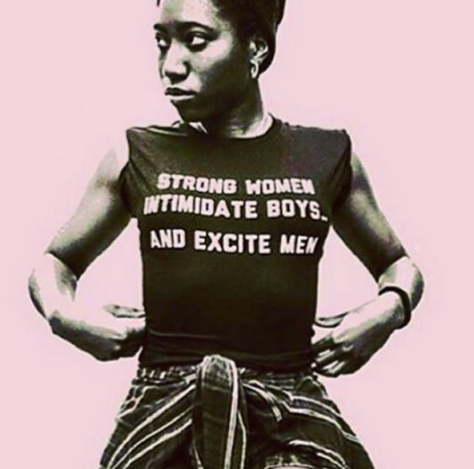
Society does not always respond very well to dominant women. We are often seen as rude, bossy, unnatural, or a challenge to be put back in our “rightful place”. I loved being in a military cadet program in high school because it was the one place where my dominant side was applauded and nurtured instead of squashed. But even there, I was still usually under the authority of men who outranked me.
When I became more dominant and confident in my opinions and attitudes, people from my religious past called me hateful, rude, and inappropriate. We were raised to be sweet and accommodating, and to only ruffle feathers when we were promoting the church’s ideas (which were usually decided by men). Basically the message we got was “don’t think for yourself, just channel your passion into roles that WE set out for you.” One man told me that I could disagree with him but only if my opinions didn’t contradict scripture. And who decided what contradicted scripture? We both knew he felt that was his job.
I eventually called bullshit. Ohmigod how horrible, a woman who thinks for herself and won’t do as she’s told! (gasp) THE WORLD IS ENDING! GRAB YOUR DICKS, THE DOMINANT WOMEN ARE COMING TO DESTROY YOUR MASCULINITY!
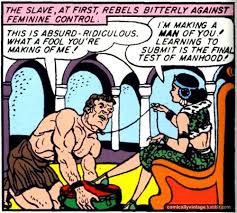
Being a dominant woman means my dating pool has shrunk greatly. Many mainstream men are intimidated by me now, and not in a submissive way but more of a “your dominance makes me insecure in my masculinity so the problem must be with you!” kind of way, and that’s not a good fit for anyone in a relationship. And many of the men who are interested in my dominance are interested in it as a fetish, because of what they want from me sexually or emotionally. That’s fine in some contexts, such as my pro domme work, but it’s not really what I want in a loving dating relationship. I’m a person with needs and desires of my own, not just a kink goddess that will service their fetishes.
Not only must I look for emotional maturity, reliability and good chemistry, but now I must also look for partners who are not turned off by the fact that I may be more dominant as a femme than they are as a masculine type. Instead of letting a man always lead and teach like I was raised, I’m not afraid to jump in and take the reigns myself. Not everyone is cool with that.
Fortunately in the kink community there are many awesome masculine types who love my dominance without overly focusing on it as a fetish. It’s one of the many reasons why I don’t bother with vanilla dating anymore; it would take so much work to become compatible with a vanilla guy that it doesn’t seem worthwhile for me in most cases.

As with most of my writings, this may easily apply to people of other genders not mentioned here.
Gossip vs Vetting and Other Necessary Communication
When does talking about somebody else cease to be necessary or helpful and become gossip?
In our community, vetting is an essential part of our community safety. If we don’t share some relevant information with each other, that can potentially put others at risk for being harmed or manipulated. But where do we draw the line? I think there are some criteria to consider.
- Would the lack of this information potentially cause harm or distress to the person you’re talking to?
- Are they directly involved in the situation that’s being discussed? Are you directly involved?
- Are they trying to ascertain someone’s safety or trustworthiness, or what the person’s community reputation is, and you have firsthand or other reliable knowledge that would help them make a more accurate decision?
- Is the purpose of the conversation to help someone be informed about things that could directly affect them, or is the goal to unfairly discredit or belittle someone for the speaker’s own personal agenda?
- Is the person upset because someone else has harmed or distressed them, and they are trying to process what happened by talking to a trusted friend?
I think the answers to these questions aren’t always going to be black and white, but I think they may be a good place to start. I think motive and relevance has a lot to do with what makes something gossip versus necessary communication, but it’s sometimes very difficult to judge these motives in others or even in ourselves.
Human communication is pretty screwed up at the best of times. Add in BDSM and LGBTQ issues, mental health complications, emotional responses, past abuse and triggers, and it gets really hard to navigate communication issues.
I think what’s important is to actively try to make our communication methods as helpful and ethical as possible. But, it’s important to note that we are almost certain to disagree with others on what is helpful and ethical and what is not. I think giving each other the benefit of the doubt, while also standing up for ourselves and others when needed, is important too.
I welcome respectful dialogue on this. I’m trying to improve my own communication methods and this topic is something I’d like to be better educated on. What do you think makes something unhelpful and gossip? What kind of shared information is ethical and necessary given the risks and intensity of BDSM involvement?
2 years since I came out as LGBTQ!
(BTW check out my super hot extra short haircut!!)

Facebook memories reminded me that I officially came out as bisexual (now pansexual) two years ago today.
I’ve never regretted coming out as LGBT and supporting equality, even though I’ve dealt with a lot of judgment and abandonment for it, and society can be a very scary place for us sometimes.
I’m so much happier now that I can just be myself, without feeling terrified that these feelings for people other than men somehow made me “broken” or “disgusting” or unworthy of being treated with respect and admiration. I used to be so scared and humiliated to even admit these feelings to myself because I thought they made me a bad person. I also had the fear of Hell when I was religious.
Trying to convince myself that I was “normal” resulted in even more anxiety and depression. Coming out of the closet, and getting involved in a community that adores and respects me just as I am, has helped me SO much.
Although I still have anxiety and depression, it’s getting better every day, and I know that being able to openly be myself has been a huge part of it. So thank you to everyone who has supported me as LGBTQ, and who has supported LGBTQ equality, because you guys have helped me a lot these past couple years. I needed your support and acceptance while I was figuring myself out and healing from life traumas, and you came through for me.
I’m still quite stressed about some money stuff, but even that is getting better and my anxiety has been manageable despite it. Some days I feel almost giddy because my cheerful happy creative self is back, and I’m slowly regaining my physical strength as well.
2017 is going to be a fantastic year. I have decided. It shall be full of music, art, kinky shenanigans, geeky everything, and hopefully healthy friendships and relationships. And lots of kitty snuggles. And probably copious amounts of chocolate.
Don’t compliment me by putting down other girls.
Compliments that put down other women aren’t the kind that I want to receive.
“You’re not like other girls.” Why is this a good thing? Why are other girls so unworthy of your attention?
“You’re so much prettier than most other girls.” Are you saying they are all ugly? Why should I respect you for that comment?
“I don’t like basic girls, they’re so boring and bad in bed. You’re interesting.” Um…
“Most girls look bad in makeup and wear too much of it, but you make it look good.” Ahhh!!! No!!!
“I’m so glad you’re not like other girls that dress like a (insert “prude” or “immodest worldly woman” comment here).” How a woman dresses does not determine her self-respect, morality, or ability to be good in bed.
Why do we think that putting other girls down is a good way to build up someone else? It’s not, and yet people on both ends of the modesty/body exposure spectrum do it to us all the time. Either we are called prudes for covering up, or we are shamed for showing off our body when we finally overcome our body image issues enough to be proud of how we look.
All women have beauty. All women are worthy of love and respect, no matter what we wear or how pretty we are or how “basic” we are.
So if your compliments involve putting down other women to make your partner feel good, then may I suggest that perhaps there is a level of disrespect and judgment towards women in your mindset? And perhaps, just maybe, it’s ok to compliment the women in your life while still acknowledging the value of other women?
I’d like to hear compliments that DON’T involve comparison. Things like:
“You look so beautiful in that dress, I just want to look at you all day.”
“I love that you are just as beautiful whether you wear makeup or not.”
“I’m amazed by your compassion and intelligence.”
“Your commitment to personal growth is so admirable.”
“You worked really hard today. Thank you.”
“Damn girl, your ass is looking FINE today. I’d tap that. With your consent, of course.”
“I’m so glad that our personal values and interests are compatible. Thank you for being someone I can relate to and confide in.”
Do you see the difference? Instead of putting other girls down for not being like your girl, or for not being a good match for you, why not just focus on what makes her amazing to you personally?
Note: This also applies to other genders, not just women.
Poly Groups are Only as Strong as the Weakest Link
Over the past few years of observing dozens of kinds of polyamorous relationships and talking to people about what they’ve also observed in their circles, I’ve come to the conclusion that poly groups (or Relationship Anarchist groups) are only as healthy as the people in them. Unhealthy-minded people tend to be in unhealthy poly groups that are either very dysfunctional or do not last long.
What makes someone a weak poly link? I don’t think it has anything to do with physical strength, self confidence, or even being free from mental or physical illness. I think that “poly weakness” comes down to a person’s inability or refusal to improve their communication skills, and a lack of motivation to learn from their mistakes and change their behavior. It also involves a lack of willingness to compromise and increase their empathy for all the people involved.
Regardless of how connected metamours may or may not be to each other, polyamory is always a team effort. If one partner is wearing out the shared partner with their unhealthy relationship practices that they refuse to change, then the shared partner will not have much energy or time left to be emotionally supportive for their other partners. If one partner is influencing the shared partner to give into bad habits and stop pursuing personal growth, that will always affect the other partners. One unhealthy-minded person, even on the fringes of a poly group, can have devastating effects on the entire group if it’s left unchecked.
Even the most fucked up people in the world can, and do, have wonderful healthy poly relationships. I see it all the time, and it warms my heart to see imperfect people supporting each other and growing as a group. But the thing they all seem to have in common is that they try really hard to communicate effectively, and they strive to learn and grow from each mistake. Those who don’t communicate and don’t learn from their mistakes tend to lose their relationship stability very quickly because poly is intense and complicated, and there’s no place for intentional emotional immaturity.
Poly is hard work, and it requires focused effort from all the participants in order to keep it healthy. Things that people could get away with in monogamy can’t be ignored in polyamory because poly requires such a healthy foundation and teamwork for it to function. Unhealthy relationship practices and mindsets must be dragged out of our dark corners and worked on until they are more compatible with a healthy poly situation. This is brutally uncomfortable sometimes, and I inwardly groan every time I have to face my weaknesses in communication, conflict resolution, and mental health management, but facing these weaknesses is absolutely vital to becoming a healthier poly partner.
The point is that we try, and we never stop trying. We learn and grow as a team, and that’s how we thrive.
Experienced poly people, especially ones who have been doing this for a long time, what tips do you have for people looking to start their own poly groups or improve their existing ones? What pitfalls have you personally observed in poly groups? Do you agree with my thoughts or think I’m way off? Respectful dialogue is welcome. 🙂
Better to be uncomfortable than stagnant.
Growth is hard. Personal development is often uncomfortable and exhausting. Becoming a better version of myself, and healing from past traumas and hurts, requires constant vigilance and self-reflection. Some days I get frustrated because I see how often I could have done better, while other days make me smile because I see how far I’ve come over the years, especially this past year. I’ve had to analyze myself so much out of necessity that I’ve become painfully aware of my shortcomings and weaknesses. Facing my fears has become a natural part of life for me. And it SUCKS most of the time. Most people don’t really like having to face their demons and closet skeletons, after all.
But it’s ok. It’s good, even. This is life; this is how we grow and change for the better. The important thing is that we are constantly trying to become the best possible versions of ourselves, and to find better ways of handling what life throws at us. I would rather be painfully aware of my weak areas, but also be confident in my ability to slowly remedy them, than to pretend I’m perfect and never make progress in improving myself.
I used to fear traumas and hurtful people. I still do, but now what I fear most is not growing.
Growing is what helps me survive and find happiness again.
Growing is what makes me more capable of handling scary traumas and hurtful people.
Growing is what takes my past traumas and fears and helps to turn them into compassion for others instead of hatred.
Personal growth is the biggest, badass life weapon I’ve got, and I don’t ever want to put it down. It becomes rather addictive after a while; it kinda feels like a superpower. : P
I’ve heard it said that the only person we should want to be better than is the person we were yesterday. I couldn’t agree more.
I hope that 2017 is a year of unprecedented personal growth for all of us. May we all become better, happier versions of ourselves this coming year. : )


